Report proposes new civil service framework
In April, the Partnership for Public Service and Booz Allen Hamilton released a report calling for major reforms to the federal government’s decades-old civil service system. According to the report, while the type of work and skills needed to carry out civil service work have changed, the current civil service system remains “a relic of a bygone era,” and is not conducive to addressing today’s complex, interagency challenges.
Planning for and supporting the future federal workforce will require adapting to change, and the Partnership report suggests six ways to overhaul the current civil service framework, including unifying the civil service and investing in leadership.
A unified civil service system would enable the federal government to act as an integrated enterprise. The unified service would be joined together by core civil service principles based on lessons learned across multiple agencies that can be used to address issues in 21st century government. The report also suggests creating a single senior federal executive service to foster interagency mobility and the development and deployment of that cadre of elite enterprise executives who can handle multi-agency missions and functions.
The suggested framework also includes a four-tier senior executive service leadership structure, with the top tier reserved for a small number of enterprise executives who have demonstrated the skills necessary to take on government-wide responsibilities and lead cross-agency initiatives. Among their qualifications, these executives would need strong collaborative skills and the ability to lead across organizational boundaries and utilize inter-organizational networks. They would also need to facilitate interagency collaboration through a shared sense of mission.
For more information on the civil service framework, please follow the links below.
Building the Enterprise: A New Civil Service Framework, Partnership for Public Service
The Partnership’s Plan for a New and Improved Civil Service, Brookings

Posted: May 7, 2014 by Simons Center
READ THE LATEST UPDATES FROM THE SIMONS CENTER
"*" indicates required fields



